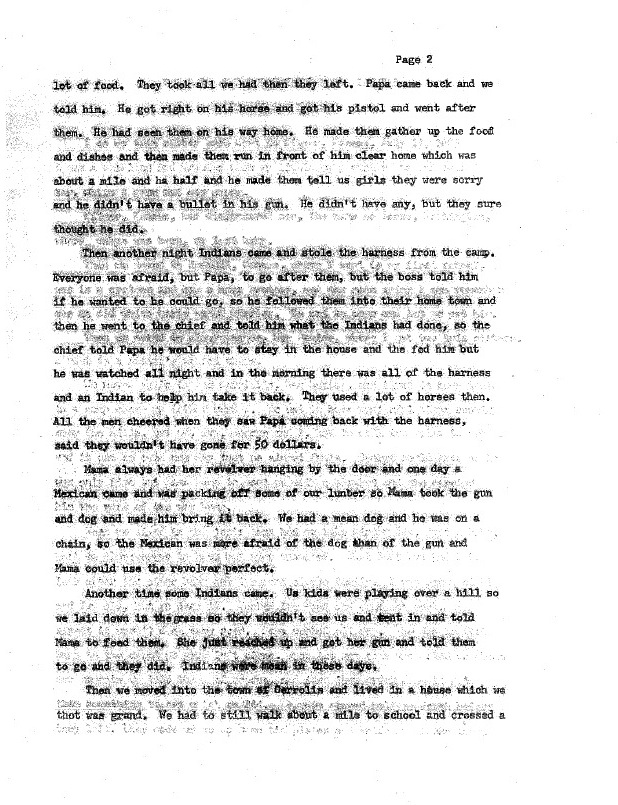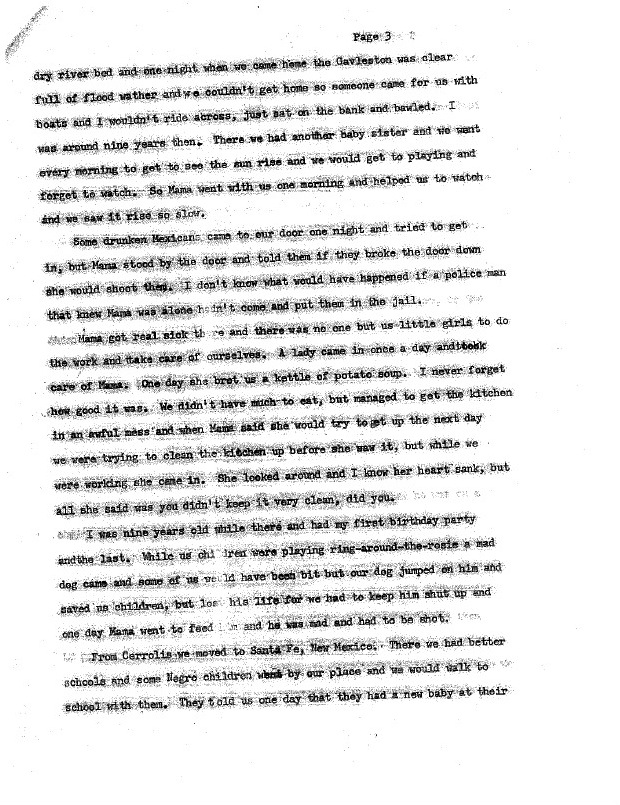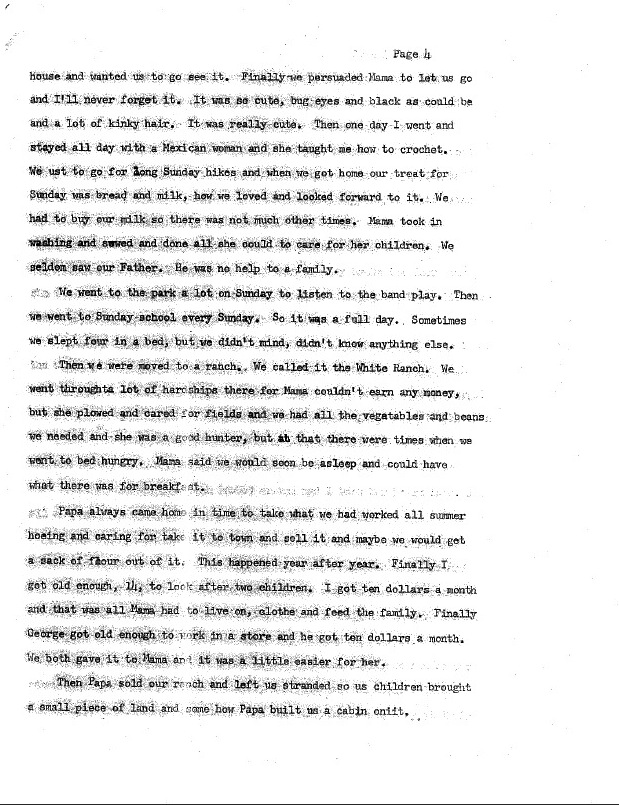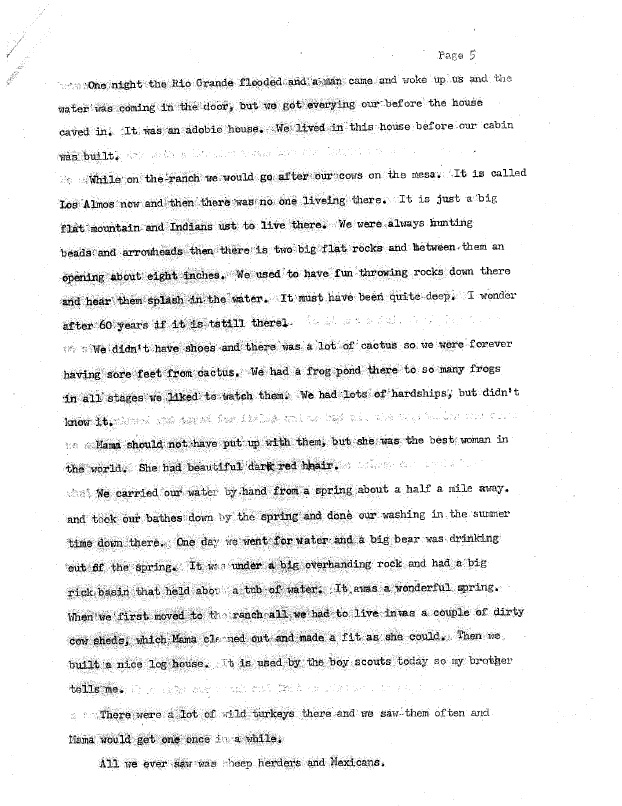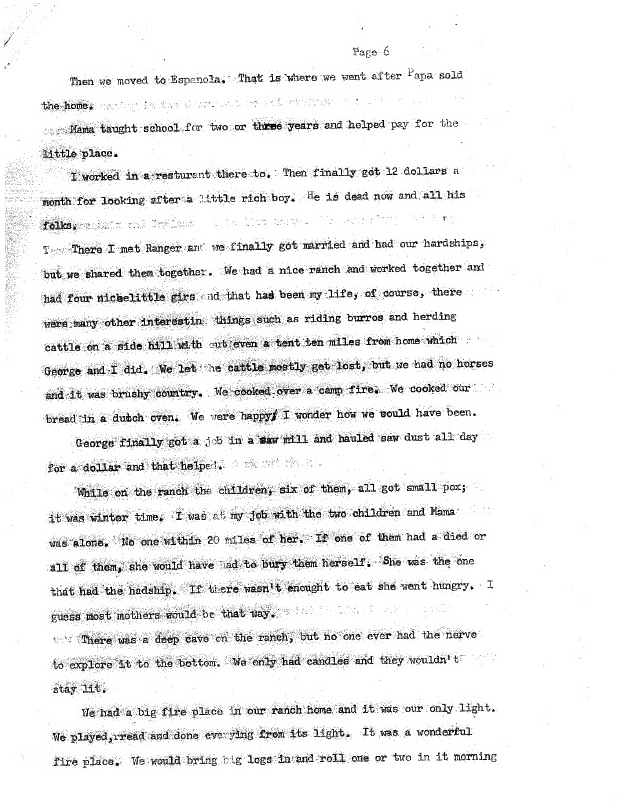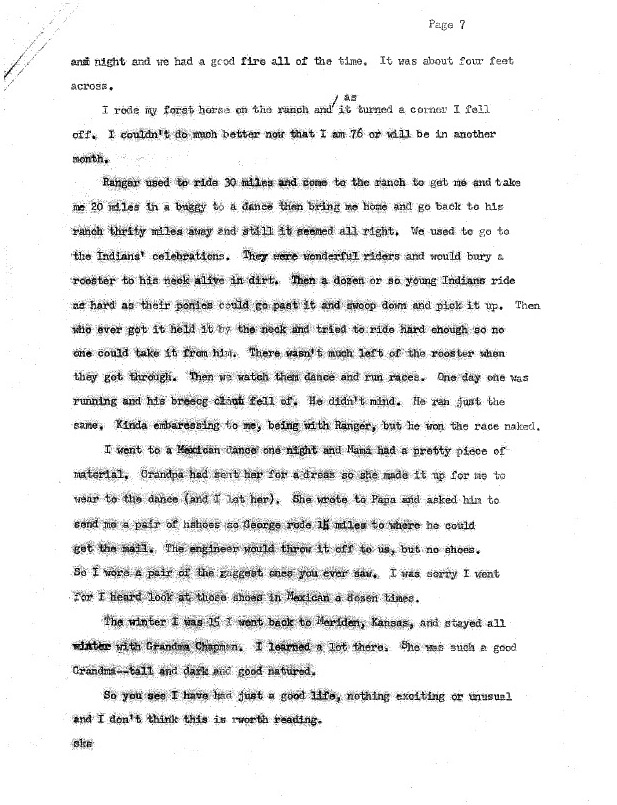|
|
|
|
|
|
|
|
|
|
Memoir and Autobiography
A Very Uneventful Life To the right is a copy of Ema's original typed manuscript, written in June, 1959. Even though the typing is sometimes difficult to make out—the ribbon ink faded and smudged, the paper yellowed, some pages crooked or wrinkled—it's still a compelling read. To make it easier to read, however, the manuscript has been transcribed for you below. The take away message here is that your descendants won't care whether your memoir is long or short, edited or stream of consciousness, beautifully printed and bound or a bit of a mess—they just want to know your story. Page 1 transcribed (unedited):I and my twin sister were born in Kilmer, Kansas, July 17, 1883. I was a weakling and Grandma took my little baby sister Eva and raised her, while I grew fat and sassy. Kilmer, Kansas, has disapppeared now, the same as Leese, Washington, where Evelyn was born, my last baby.
Then we moved to Roswell, Kansas, where I went to my first school, was in a cyclone and had a baby brother, and the main thing I can remember was an old white horse named Charley. He ust to come and let me pet him.
Then we moved to Alburquerque, New Mexico, where I got two twin sisters. I went to a sister's school there. We moved again to Los Cerriolis, New Mexico, and lived in some tents in a camp where my father worked. We ust to have wonderful times running over the hills, but we, Iva, George and I, had to walk two miles to school and it was so cold one day that we almost froze. George would have as he was only five but Mama came to meet us with a blanket and she carried him the rest of the way home.
When we lived in the tents Moma had to take sister Ida, just a baby, back to Albuquerque to have her eyes examined. That left Iva and I to look after the other baby and the rest of the family. I was about eight and Iva six, but we done it. Cooked for Papa and done the work. I expect it wasn't done very good. Papa worked all day. The day he took Mama to the depot we were left alone, when two men came and asked us about our parents we told them, of course, and then they ordered us to get them something to eat which we did/We were scared half to death before they left, they made us do up some tin plates and knife and forks and a
Page 2:
lot of food. They took all we had then they left. Pap came back and we told him. He got right on his horse and got his pistol and went after them. He had seen them on his way home. He made them gather up the food and dishes and then made them run in front of him clear home which was about a mile and a half and he made them tell us girls they were sory and he didn't have a bullet in his gun. He didn't have any, but they sure thought he did.
Then another night Indians came and stole the harness from the camp. Everyone was afraid, but Papa, to go after them, but the boss told him if he wanted to he could go, so he followed them into their home town and then he went to the chief and told him what the Indians had done, do the chief told Papa he would have to stay in the house and they fed him but he was watched all night and in the morning there was all of the harness an an Indian to help him take it back. They used a lot of horses then. All the men cheered when they saw Papa coming back from the harness, said they wouldn't have gone for 50 dollars.
Mana always had her revolver hanging by the door and one day a Mexican came and was packing off some of our lunber so Mana took the gun and dog and made him bring it back. We had a mean dog and he was on a chain, so the Mexican was more afraid of the dog than of the gun and Mana could use the revolver perfect.
Another time some Indians came. Us kids were playing over a hill so we laid down in the grass so they wouldn't see us and went in and told Mama to feed them. She just reached up and got her gun and told them to go and they did. Indians were mean in those days.
Then we moved into the town of Cerrolis and lived in a house which we thot was grand. We had to still walk about a mile to school and crossed a
Page 3:
dry river bed and one night when we came home the Galveston was clear full of flood water and we couldn't get home so someone came for us with boats and I wouldn't ride across, just sat on the bank and bawled. I was around nine years then. There we had another baby sister and we went every morning to get to see the sun rise and we would get to playing and forget to watch. So Mana went with us one morning and helped us to watch and we saw it rise so slow.
Some drunken Mexicans came to our door one night and tried to get in, but Mana stood by the door and told them if they broke the door down she would shoot them. I don't know what would have happened if a police man that knew Mana was alone hadn't come and put them in jail.
Mama got real sick there and there was no one but us little girls to do the work and take care of ourselves. A lady came in once a day and took care of Mama. One day se bret us a kettle of potato soup. I never forget how good it was. We didn't have much to eat, but managed to get the kitchen in an awful mess and when Mama said she would try to get up the next day we were trying to clean the kitchen up before she saw it, whit while we were working she came in. She looked around and I know her heart sank, but all she said was you didn't keep it very clean, did you.
I was nine years old while there and had my first birthday party and the last. While us children were playing ring-around-the-rosie a mad dog came and some of us would have been bit but our dog jumped on him and saved us children, but lost his life for we had to keep him shut up and one day Mana went to feed him and he was mad and had to be shot.
From Cerrolis we moved to Santa Fe, New Mexico. There we had better schools and some Negro children went by our place and we would walk to school with them. They told us one day that they had a new baby at their
Page 4:
house and wanted us to go see it. Finally we persuaded Mama to let us go and I'll never forget it. It was so cute, but eyes and black as could be and a lot of kinky hair. It was really cute. Then one day I went and stayed all day with a Mexican woman and she taught me how to crochet. We ust to go for long Sunday hikes and when we got home our treat for Sunday was bread and mikl, how we loved and looed forward to it. We had to buy our milk so there was not much other times. Mama tok in washing and sewed and done all she could to care for her children. We seldom saw our Father. He was no help to a family.
We went to the park a lot on Sunday to listen to the band play. Then we went to Sunday school every Sunday. So it was a full day. Sometimes we slept four in a bed, but we didn't mind, didn't know anything else.
Then we were moved to a ranch. We called it the White Ranch. We went through a lot of hardships there for Mama couldn't earn any money, but she plowed and cared for fields and we had all the vegetables and beans we needed and she was a good hunter, but at that there were times when we went to bed hungry. Mama said we would soon be asleep and could have what there was for breakfast.
Papa always came home in time to take what we had worked all summer hoeing and caring for take it to town and sell it and maybe we would get a sack of flour out of it. This happened year after year. Finally I got old enough, 14, to look after two children. I got ten dollars a month and that was all Mama had to live on, clothe and feed the family. Finally George got old enough to work in a store and he got ten dollars a month. We both gave it to Mama and it was a little easier for her.
Then Papa sold our ranch and left us stranded so us children brought a small piece of land and some how Papa built us a cabin on it.
Page 5:
One night the Rio Grande flooded and a man came and woke up us and the water was coming in the door, but we got everything our before the house caved in. It was an adobie house. We lived in the house before our cabin was built.
While on the ranch we would go after our cows on the mesa. It is called Les Almos now and then there was no one living there. It is just a big flat mountain and Indians ust to live there. We were always hunting beads and arrowheads then there is two big flat rocks and between them an opening about eight inches. We used to have fun throwing rocks down there and hear them splash in the water. It must have been quite deep. I wonder after 60 years if it is still there.
We didn't have shoes and there was a lot of cactus so we were forever having sore feet from cactus. We had a frog pond there to so many frogs in all stages we liked to watch them. We had lots of hardships, but didn't know it.
Mama should not have put up with them, but she was the best woman in the world. She had beautiful dark red hair.
We carried our water by hand from a spring about a half mile away. and took our bathes down by the spring and done our washing in the summer time down there. One day we went for water and a big bear was drinking out of the spring. It was under a big overhanging rock and had a big rick basin that held a tub of water. IT was a wonderful spring. When we first moved to the ranch all we had to live was a couple of dirty cow sheds, which Mama cleaned out and made a fit as she could. Then we built a nice log house. It is used by the boy scouts today so my brother tells me.
There were a lot of wild turkeys there and we saw them often and Mana would get one once in a while.
Page 6:
Then we moved to Espanola. That is where we went after Papa sold the home.
Mana taught school for two or three years and helped pay for the little place.
I worked in a resturant there to. Then finally got 12 dollars a month looking after a little rich boy. He is dead now and all his folks.
There I met Ranger and we finally got married and had our hardships but we shared together. We had a nice rance and worked together and four nice little girls and that has been my life, of course, there many other intersting things such as riding burros and herding cattle on a side hill without even a tent ten miles from homw which George and I did. We let the cattle mostly get lost, but we had no horses and it was brushy country. We cooked over a camp fire. We cooked our bread in a dutch oven. We were happy. I wonder how we could have been.
George finally got a job in a saw mill and hauled saw dust all day for a dollar and that helped.
While on the ranch the children, six of them, all got small pox; it was winter time. I was at my job with the two children and Mama was a lone. No one within 20 miles of her. If one of them had a died or all of them, she would have had to bury them herself. She was the one that had the hadship. If there wasn't enough to eat she went hungry. I guess most mothers would be that way.
There was a deep cave on the ranch, but no one ever had the nerve to explore to the bottom. We only had candles and they wouldn't stay lit.
We had a big fire place in our ranch home and it was our only light. We played, read and done everything from its light. It was a wonderful fireplace. We would bring big logs in and roll one or two in it morning
Page 7:
and night and we had a good fire all of the time. It was about four feet across.
I rode my first horse on the ranch and as it turned a corner I fell off. I couldn't do much better now that I am 76 or will be in another month.
Rangar used to ride 30 miles and come to the ranch to get me and take me 20 miles in a buggy to a dance then bring me home and go back to his ranch thirty miles and still it seemed all right. We used to go to the Indian's celebrations. They wee wonderful riders and would bury a rooster to his neck alive in the dirt. They a dozen or so youn Indians ride as hard as their ponies could go past it and swoop down and pick it up. Then who ever got it held it by the neck and tried to ride hard enough so no one could take it from him. There wasn't much left of the rooster when they got through. Then we watch them dance and run races. One day one was running and his beech cloth fell of. He didn't mind. He ran just the same. Kinda embarrassing to me, being with Ranger, but he won the race naked.
I went to a Mexican dance one night and Mama had a pretty piece of material, Grandpa had sent her for a dress so she made it up for me to wear to the dance (and I let her). She wrote to Papa and asked him to send me a pair of shoes so George rode 15 miles to where he could get the mail. The engineer would throw it off to us, but no shoes. So I wore a pair of the ugliest ones you ever saw. I was sorry I went for I heard look at those shoes in Mexican a dozen times.
The winter I was 15 I went back to Meriden, Kansas, and stayed all winter with Grama Chapman. I learned a lot there. She was such a good Grandma—tall and dark and good natured.
So you see I have had just a good life, nothing exciting or unusual and I don't think this is worth reading.
Sorry, Ema, we have to disagree. That was pretty awesome! Material in American Typewriter font above © 1959 by Ema Elmira Lesse; reprinted here with the kind permission of Ema's grandsons (Rodney, Delmar and Clyde) and great granddaughter, Debra.
Page created April, 2017.
|
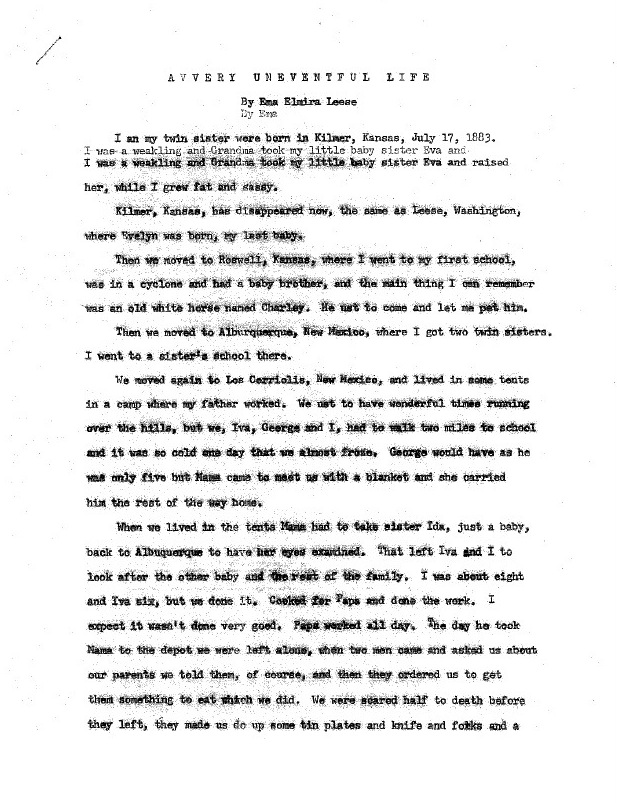
Boxed content above © 1959 by Ema Elmira Lesse; reprinted with the kind permission of Ema's grandsons (Rodney, Delmar and Clyde) and great granddaughter, Debra. |
